

Demografía española tras la COVID-19: menos esperanza de vida. Todas las variables demográficas están siendo alteradas por la pandemia del coronavirus.

Es pronto para hacer un balance cuantitativo ante la carencia de las cifras necesarias, pero sí se pueden señalar tendencias orientadoras de los giros detectados. Y, sin lugar a dudas, el componente más afectado por esta situación es la mortalidad. Como si de una manifestación se tratase, también en esto hay guerra de cifras. Spain's population set to drop 11% by 2050. Spain by 2050 will be a depopulated nation dominated by elderly and single people, according to a report that predicts the country will have lost 5.3 million inhabitants, or 11% of the current population, by the middle of the century.
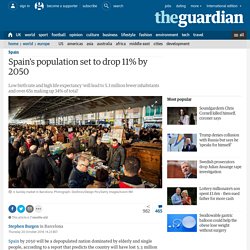
Spain’s low birth rate and high life expectancy are seen as a demographic problem that the report, released by the national statistics office on Thursday, expects to become more entrenched. If the trends continue, by 2050 the over-65s will make up 34.6% of the population, while close to a quarter of a million Spaniards will be over 100 years old. By that date there will be 1.7 million fewer children under 10 than there are today. A country also once famed for large families seems destined to become a nation of singletons, with single-person households rising by about a fifth over the next 15 years, to make up 28% of the total. La “esperanza de vida” a lo largo de la historia humana. En la actualidad, España es el país con la esperanza de vida más larga de Europa, con las mujeres viviendo a una media de 82 años y los hombres a una media de 78.

Desde hace tiempo me ha fascinado el tema de la longevidad humana. Cuando hice una investigación sobre la evolución de la esperanza de vida a lo largo de la historia humana, me topé con una estadística que a primera vista parecía chocante: en 1900, la “media esperanza de vida” en España no llegaban a los 35 años, y en China e India ni siquiera llegaba a los 25. Al leer estos datos, la primera impresión que tendría mucha gente es que hace un siglo todo el mundo moría antes de los 35 años, y si tenías 33 ya eras un “viejo”. España cuenta con el tercer sistema sanitario más eficiente del mundo Noticias, última hora, vídeos y fotos de Interés Humano - Sociedad en lainformacion.com. Hace unos días que se publicó el Bloomberg Health Care Efficiency Index, que mide la eficiencia de los sistemas sanitarios bajo tres parámetros: Esperanza de vida, gasto en salud per cápita y peso relativo del gasto sanitario sobre el PIB y nos llevamos una agradable sorpresa, ya que de los 55 países que aparecen en el ránking, España figura en la tercera posición frente la octava posición que ocupaba el año pasado.
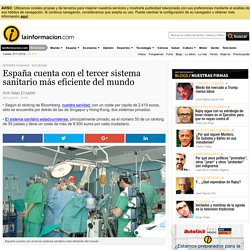
Todo es mejorable en la vida, pero aparecer en las primeras posiciones de un ránking en algo tan importante cómo la salud sin duda es esperanzador. DT 2006 11. Population changes in Spain: Why deaths now beat out births in Spain. For the first time since the data series began, there have been more deaths than births in Spain.
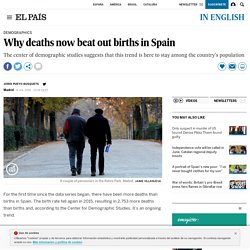
The birth rate fell again in 2015, resulting in 2,753 more deaths than births and, according to the Center for Demographic Studies, it’s an ongoing trend. The study published by the National Institute of Statistics (INE) indicated that the number of women of childbearing age has also dropped. The study indicates that the number of women of childbearing age has also dropped Births have fallen by 19.4% since 2008, when the biggest drop for three decades was registered. Fertility rate: 'Jaw-dropping' global crash in children being born.
Spain - Population. Spain Table of Contents Size and Growth In mid-1985, Spain's population reached 38.8 million, making it Western Europe's fifth most populous nation.
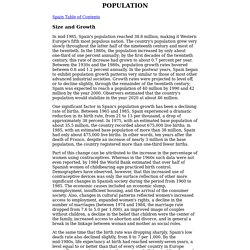
The country's population grew very slowly throughout the latter half of the nineteenth century and most of the twentieth. In the 1860s, the population increased by only about one-third of one percent annually; by the first decades of the twentieth century, this rate of increase had grown to about 0.7 percent per year. Between the 1930s and the 1980s, population growth rates hovered between 0.8 and 1.2 percent annually. One significant factor in Spain's population growth has been a declining rate of births. Part of this change can be attributed to the increase in the percentage of women using contraceptives.
At the same time that the birth rate was dropping sharply, Spain's low death rate also declined slightly, from 8 to 7 per 1,000. Regional Disparities Migration Ethnicity and Language Custom Search Source: U.S. Is it time for Spain to address its plummeting birth rate? During the dictatorship, a bizarre annual ceremony featured leader Francisco Franco handing out a National Birth Prize to couples with the largest families.
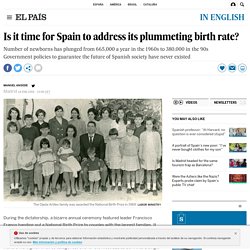
It was widely covered by the official media at the time. Honors were given in three categories: one for the most babies born into a single family; another to the family with the most surviving children (a testament to the high infant mortality rates at the time); and one for the couple with the largest number of descendants still living at home. In 1972, third prize went to Julián Amor Gómez, a 48-year-old blue-collar worker from Lagartera, Toledo province, who was married to Pilar Iglesias Arroyo, according to the daily ABC. “They have 18 children who are still alive and all live under the same roof,” the newspaper reported at the time. We are witnessing a rapid decline in births and it seems that nobody cares”Julio Vinuesa, demographer at Madrid’s Autónoma University “They never have existed,” he says.
An ageing UK population - How the UK population is changing in the 21st century - OCR - GCSE Geography Revision - OCR - BBC Bitesize. Poblacion 27 alicante. Demographics of Spain - Wikipedia.